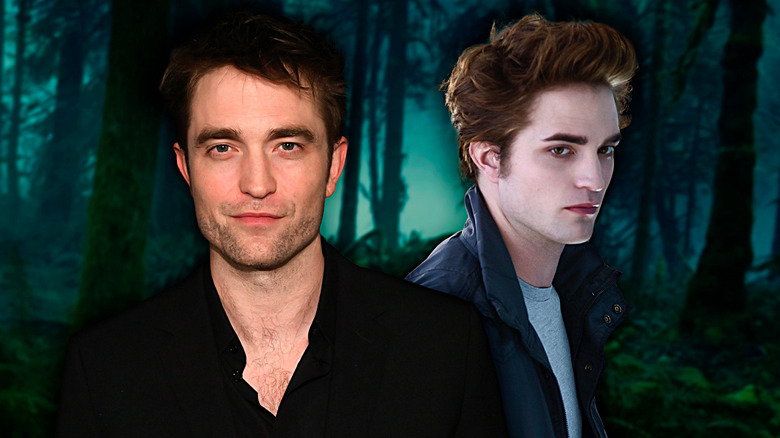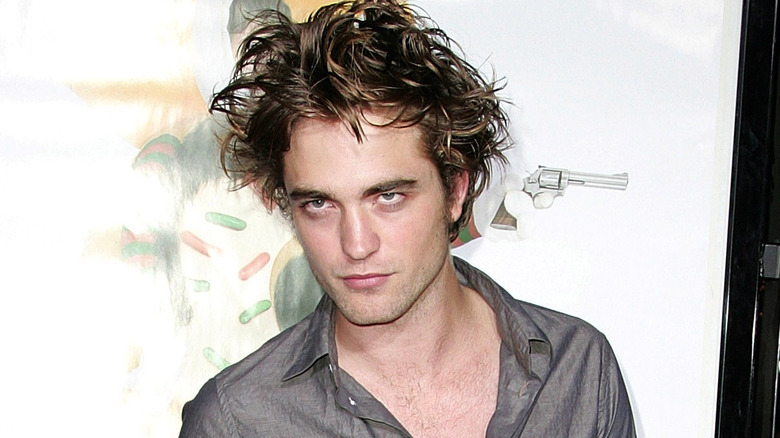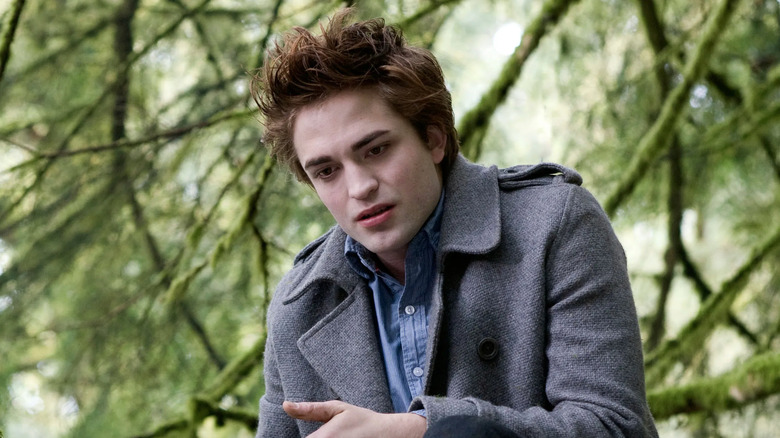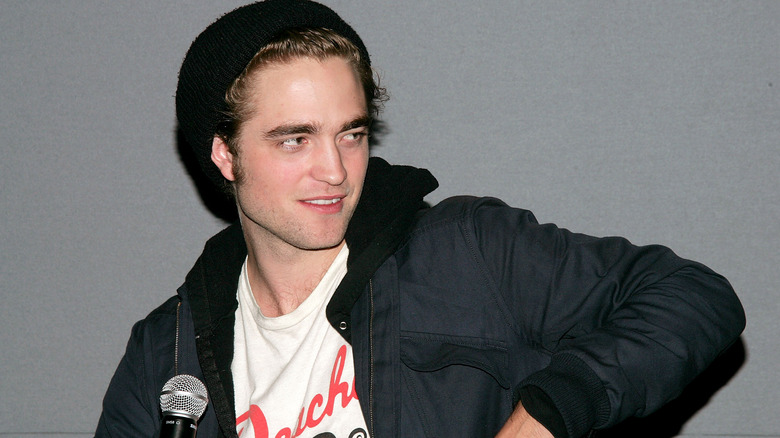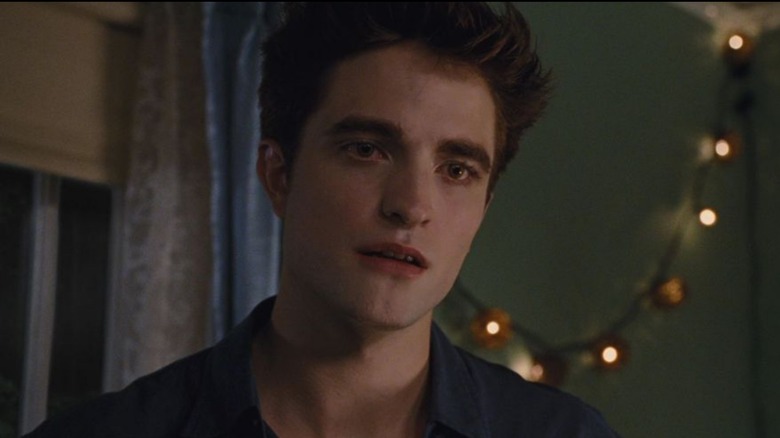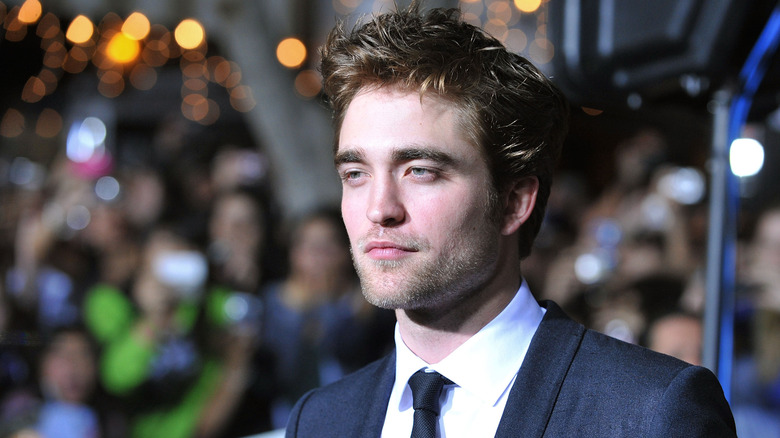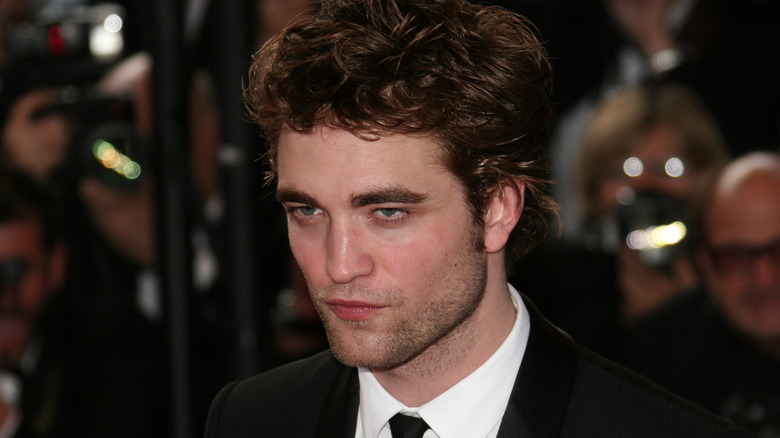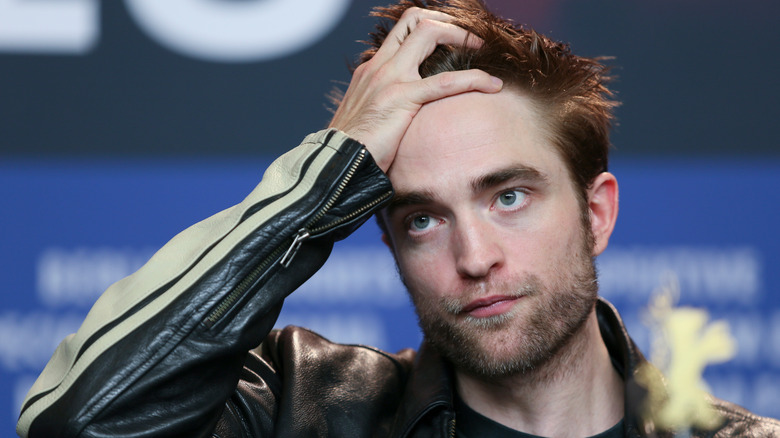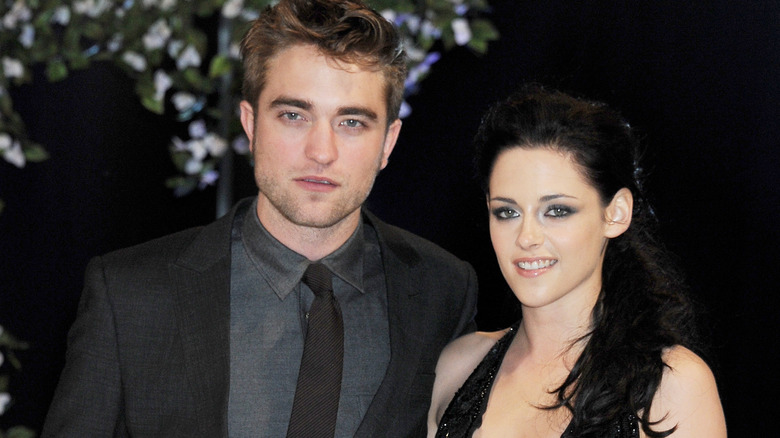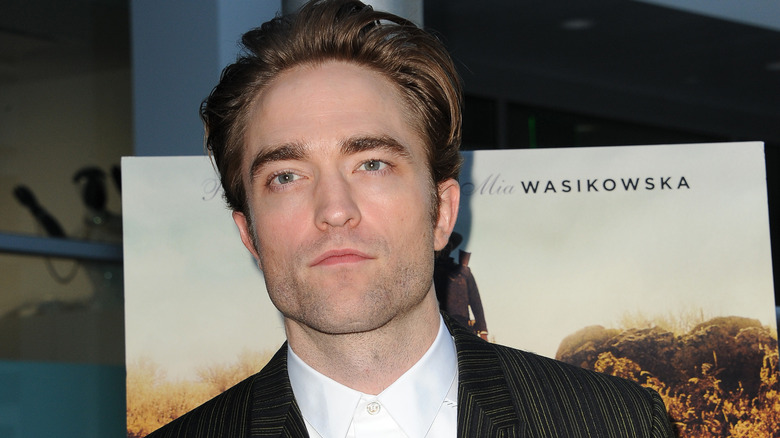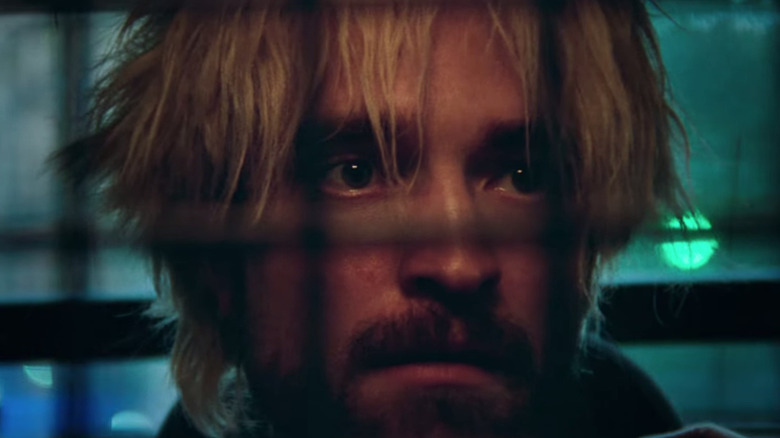Why Robert Pattinson Was Never The Same After Twilight
Before gaining stardom as the sparkling, brooding vampire Edward Cullen, Robert Pattinson was a relatively unknown actor whose initial claim to fame was portraying Cedric Diggory in "Harry Potter and the Goblet of Fire." Soon enough, though, the whole world would know his name. On November 21, 2008, the romantic fantasy "Twilight" was released, and Pattinson became one of Hollywood's biggest stars overnight.
While his newfound fame and fortune came with its perks, it also came with its fair share of setbacks. Only 22 years old when "Twilight" took the world by storm, Pattinson was still trying to figure out what kind of actor he wanted to be. Over the next four years, he became synonymous with the character of Edward as "The Twilight Saga" unfolded. In between each of the five installments, he made efforts to diversify his roles with various projects. While some were the obvious lackluster romances, his role in David Cronenberg's "Cosmopolis" exposed him to a new realm of filmmaking.
Once "The Twilight Saga" wrapped up in 2012 with "Breaking Dawn: Part 2," Pattinson's next career moves were crucial. While many actors might have pursued big-budget mainstream projects, Pattinson chose to star exclusively in independent films as a way to distance himself from the teen heartthrob image associated with the vampire franchise. He has since reentered the mainstream spotlight with his titular role in Matt Reeves' "The Batman," but over the years, Pattinson's career and personal life have undergone a transformative evolution. And it all began with an unassuming vampire book adaptation.
He underwent a transformation
When director Matt Reeves revealed the first camera test for "The Batman" in February 2020, the internet had a lot to say about Robert Pattinson's casting, and it wasn't all great. But negative reactions to casting announcements are nothing new in the world of entertainment: Pattinson faced a similar wave of criticism when he was cast as Edward in "Twilight," and even the studio executives at Summit Entertainment joined in on the uncertainty.
Pattinson' audition for "Twilight" took place at director Catherine Hardwicke's home in Venice, California. Pattinson told GQ that he began developing anxiety about auditioning that would leave him wanting to back out at the last minute. This feeling hit him the day of his "Twilight" audition, and to cope, he took Valium for the first time. "I think I had this sort of quite spacey and detached kind of thing in the audition," he recalled.
Pattinson's drugged state seemed to work in his favor because he managed to convince Hardwicke — but only barely. "When I turned up for the audition, I had done a job where I'd dyed my hair black, but I had an inch and a half of roots, and I had waxed my body," Pattinson told Allure. "And then I had a few months where I'd been drinking beer all day, so I had this hairless, chubby body." Thus began his physical transformation into the sultry vampire that doubters eventually came to love.
He was almost fired from Twilight
Approaching his performance in "Twilight" with an artsy interpretation that execs at Summit quickly grew weary of, Robert Pattinson was reprimanded for driving the film in a more "emo" direction. In his interview with GQ, Pattinson recalled the day his agent pulled him aside and warned him that he would be dismissed if he didn't change his performance style. "At lunch, they were like, 'Okay, so whatever you're doing right now, after lunch, just do the opposite, or you'll be fired by the end of the day,'" Pattinson said. Although the stubborn, 21-year-old Pattinson didn't agree with that choice, he followed through with a more toned-down and lighthearted approach — but not too lighthearted, otherwise Pattinson believed he'd "probably end up looking more like a psychopath."
Looking back on the movie now, Pattinson stands by his interpretation. While others see "Twilight" as a cheesy mainstream vampire romance, Pattinson still recognizes its artistry. "I look at the 'Twilight' movies," he later told GQ, "and I think in a lot of ways they seem more like sort of existential art house movies than the things that were intentionally that." For fans who feel as though they've missed out on Pattinson's unrestrained moodiness, his brooding portrayal of the Caped Crusader in "The Batman" may offer solace.
He was broke while auditioning for Twilight
It had been three years since Robert Pattinson had portrayed Cedric Diggory in "Harry Potter and the Goblet of Fire" when he went to audition for "Twilight." The cash he had been living off from that job was dwindling fast. Although Pattinson would have no idea how big of a success "Twilight" would be, there was no denying the importance of landing this role.
Up until then, he had been focused on a music career. "I really thought I was going to do music at that point," he told GQ, "and then I ran out of money basically." Pattinson flew to L.A. from London on his own dime for the audition and slept on his agent's couch. "I was definitely going in the wrong direction in terms of a career, up until 'Twilight,'" he added.
Every year the "Twilight" movies were released, Pattinson ranked as one of the top earners in Hollywood. In 2009, he appeared in Vanity Fair's "Top Hollywood Earners of 2009," with an estimated income of $18 million. He made the list again the following year, with estimated earnings of $27.5 million. By 2014, he was estimated to be making triple that amount, with $82.89 million in earnings — a far cry from sleeping on his agent's couch.
He was surprised by Twilight's success
By the time "Twilight" hit theaters in 2008, all four installments in Stephenie Meyer's "The Twilight Saga" had been published, with a massive fanbase of readers. Still, no one predicted the magnitude of the movies' impact on the cultural zeitgeist, especially not Robert Pattinson, who initially had difficulty getting behind the story. "When I read it, it seemed like it was a book that wasn't supposed to be published," he once famously said in an interview (via Buzzfeed). In another interview with Jennifer Lopez for Variety, Pattinson admitted to being confused by the unexpected success of the unconventional storyline. "I mean it's a weird story, 'Twilight,'" he said. "It's strange how people responded. I guess the books, they are very romantic, but at the same time, it's not like 'The Notebook' romantic."
Pattinson's supposed disdain for the Twilight movies has become somewhat of a meme. However, he's since come to appreciate and understand the genuine affection the franchise receives from its dedicated fans. "It seems like with younger people in their late teens, early 20s, it's sort of become quite a hip thing to like," Pattinson told USA Today. "It's a fascinating second wave of people appreciating it, which is kind of cool." Looking at the project from an indie art house perspective has apparently also helped Pattinson cope; the movies' numbers, however, tell a different story.
He encountered harsh criticism early in his career
For every fan of the "Twilight" franchise, there appeared to be an equal and opposite force of detractors. Of course, this phenomenon of criticism and backlash isn't exclusive to "The Twilight Saga," as anything considered mainstream or popular is bound to become a target for ridicule. Despite box office success and an adoring fanbase, the "Twilight" movies were met with unfavorable reviews upon their release. While some criticisms, such as poor dialogue, questionable romance, and inadequate Indigenous representation, were undoubtedly valid, it is now evident in hindsight that the lead actors, Robert Pattinson and Kristen Stewart, unfairly carried the bulk of the burden as the faces of the franchise.
Unfortunately, this level of disapproval from the public contributed to Pattinson's perception of himself as an actor. "In a lot of ways, people have decided what 'Twilight' is about before they've even thought about it, and then they've labeled us, the actors, as part of whatever that may be," Pattinson told The Daily Beast. Despite acknowledging that the experience improved his acting skills, Pattinson revealed that the reviews only intensified as the franchise advanced. "I don't know who I am as an actor," he said. "I've found that the 'Twilight' movies were probably the hardest jobs I've done." Over the years, however, the perception of "The Twilight Saga" has undergone a significant transformation, recently earning it the status of a cult classic.
He became a Hollywood heartthrob
Not only did Robert Pattinson secure a spot on numerous publications' top earners' lists, but he also effortlessly landed on rankings evaluating his sex appeal in the wake of "Twilight." Pattinson swiftly transitioned to becoming the focal point adorning the bedroom walls of countless tween girls in the form of lipstick-stained posters. It became evident that taking on the role of a romantic lead in a blockbuster franchise was a surefire way to capture the hearts of the public.
As early as 2008, Pattinson has consistently appeared on various lists ranking celebrities' attractiveness, including People magazine's and Glamour UK's "Sexiest Man Alive," Vanity Fair's "Most Handsome Man in the World," and GQ's "Best Dressed Man" (twice). In 2020, Daily Mail declared him "the most handsome man in the world," consulting experts to unravel the scientific allure behind his good looks. Evaluated through the Golden Ratio of Beauty Phi, an equation rooted in Ancient Greek aesthetics, Pattinson achieved an impressive 92.15%, making him the closest to achieving the ancient Greeks' notion of facial perfection.
What does Pattinson think of all the labels? When talking about stardom with The Guardian, Pattinson said, "It's a little bit over the top. All my life, I've hated crowds. I was quite a paranoid person anyway, so it doesn't really feed well when people are looking at you. I'm not really in the right job. I don't like having my photo taken. I don't like the attention."
Fame worsened his anxiety
Feeling ill-prepared for the trappings of fame, Robert Pattinson found himself thrust into overnight stardom that irreversibly transformed every aspect of his life. "I don't think anyone can understand what's happening. You wake up one day and you're suddenly a star ... really weird," Pattinson shared with The Guardian.
The sudden onslaught saw an invasion into his private life, fans clamoring for his attention on the streets, and paparazzi meticulously tracking his every move. Acknowledging the toll on his mental health, he candidly revealed to The Telegraph, "'I get a lot of anxiety with everything." In a paradoxical twist, the very thing that catapulted him to fame became a form of therapy. "One really nice thing about acting is that it's like a weird therapy exercise," he explained. "If you're insecure or shy or something, then you can kind of experiment with expanding your horizons within the framework of fiction." He added that conventional therapy also helps.
In the years following the end of "The Twilight Saga," the whirlwind of fame has dialed down for Pattinson. "It's lovely now that the mania is not so intense," he shared with USA Today. "People come up (to me) and just have very fond memories of it. It's a really sweet thing. I think the only scary part was right in the thick of it all, when it was very, very intense."
A tumultuous relationship with Kristen Stewart
"Twilight" co-stars Robert Pattinson and Kristen Stewart have always been rather cryptic about their relationship, choosing to keep this facet of their lives private. Despite facing an abundance of relationship-related inquiries from the press, which were plentiful in the tabloids, the duo consistently sidestepped the probing questions. The speculation about their dating status and whether it was all for publicity remained unanswered at the time, as both declined to provide confirmation. However, we now know the two were very much together and in love from around 2009 until their eventual breakup in 2013.
In 2012 and 2013, during the final chapters of their relationship, the rationale behind the couple's decision to maintain their privacy began to make a lot more sense. The public uproar reached a peak when Kristen Stewart was captured in photographs sharing a kiss with her "Snow White and the Huntsman" director, Rupert Sanders. The incident stirred significant public attention, leaving Stewart deeply affected by the intense scrutiny. Shortly thereafter, she issued an apology. Although Stewart and Pattinson briefly reconciled, their relationship ultimately came to an official end in 2013, although they maintain there are no lingering hard feelings between them.
He faced career uncertainty after Twilight
Robert Pattinson faced career uncertainty upon completing "The Twilight Saga." Although Pattinson has hinted at feeling excited about finishing the series, he also acknowledged it as a daunting period in his professional journey, referring to the "Twilight" movies as his "safety net" in an interview with The Guardian. He confided, "After the last one comes out, you can kind of have two failures — and they'd better be low-budget failures. Because if you have one big-budget failure you're pretty much done in this environment."
Feeling like there was some kind of expectation to fill, Pattinson grappled with insecurity about his identity as an actor during a time when he was only just figuring himself out. Afraid of being typecast and not being taken seriously, Pattinson disclosed to Vanity Fair, "Having a persona people recognize, it's the thing that probably gets you paid the most — but it's also the thing that virtually every actor in the world doesn't want. 'Cause, like, no one would believe me if I wanted to play something ultra-realistic, like a gangster or something." Fortunately, that hasn't been a problem for Pattinson, who has proved himself to be a versatile master of his craft. Today, he is recognized foremost as a well-rounded actor, with the shadow of Edward Cullen a distant second.
Pattinson fought off typecasting
Driven by the fear of making the same film over and over and being known exclusively as Edward Cullen forever, Robert Pattinson focused on branching out to indie films that spoke to him after "The Twilight Saga" wrapped in 2012. On the last day of filming "Breaking Dawn," he was offered the lead in David Cronenberg's "Cosmopolis," thus beginning a stretch of nothing but independent films. "Right at the moment when I thought I was scared of repeating myself and bam! Cronenberg is calling me! It's better than anything I could ever dream of," Pattinson told Yahoo News.
Following "Cosmopolis," Pattinson starred in movies like David Michôd's futuristic Western "The Rover," Anton Corbijn's biographical drama "Life," the Safdie Brothers' crime thriller "Good Time," Claire Denis' sci-fi tale "High Life," and more. This unexpected career trajectory defied expectations for a budding superstar fresh from one of the decade's major franchises, but his inclination toward these low-budget, under-the-radar films was a taste he had harbored all along.
"I grew up liking classic movies, and then I was really into watching movies when I was a teenager," he told GQ. "I wanted to work with those people. But I didn't realize that you actually could." In 2020, Christopher Nolan's "Tenet" marked his much-anticipated return to mainstream, big-budget films, followed by Matt Reeves' "The Batman," proving to all the "Twilight" haters that Pattinson could, in fact, do it all.
